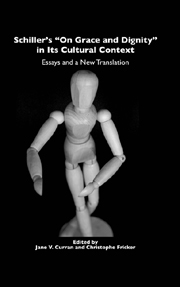Book contents
- Frontmatter
- Contents
- Acknowledgments
- Notes on References and List of Abbreviations
- Introduction
- The Cultural Context
- Schiller's Essay “Über Anmut und Würde” as Rhetorical Philosophy
- Schiller as Citizen of His Time
- Sensuous-Objective: Beauty in the Realm of Human Freedom: On the Language of Concepts in Schiller's Essay “On Grace and Dignity”
- From Romantic Dream to Idyllic Tragedy: Idealism and Realism in Schiller's Dramas, Before and After Kant
- The Poet as Herald of Grace and Dignity: The Influence of Schiller's Twin Concepts on Stefan George
- The Text
- Notes on the Contributors
- Index
From Romantic Dream to Idyllic Tragedy: Idealism and Realism in Schiller's Dramas, Before and After Kant
from The Cultural Context
Published online by Cambridge University Press: 05 February 2013
- Frontmatter
- Contents
- Acknowledgments
- Notes on References and List of Abbreviations
- Introduction
- The Cultural Context
- Schiller's Essay “Über Anmut und Würde” as Rhetorical Philosophy
- Schiller as Citizen of His Time
- Sensuous-Objective: Beauty in the Realm of Human Freedom: On the Language of Concepts in Schiller's Essay “On Grace and Dignity”
- From Romantic Dream to Idyllic Tragedy: Idealism and Realism in Schiller's Dramas, Before and After Kant
- The Poet as Herald of Grace and Dignity: The Influence of Schiller's Twin Concepts on Stefan George
- The Text
- Notes on the Contributors
- Index
Summary
In the briefe über “don karlos,” Schiller talks of a dream. Prefiguring “On Grace and Dignity,” he speaks of achieving “den vollendetsten Zustand der Menschheit” (NA 22:162; humanity in its most perfect state). He calls this dream “romanhaft” (fanciful, far-fetched). He could as easily have said romantisch, for in general eighteenth-century usage the words were almost interchangeable. Contact with practical politicians, indeed, is said to have cleansed Posa's idealism of das Romantische. Not entirely, though, for when it comes to explaining his treatment of Carlos, the “Bilder romantischer Größe” (NA 22:176; images of romantic greatness) he has imbibed from Plutarch, and which make him a (distant) cousin of Karl Moor, are called in aid. Schiller, though himself an arch-idealist, is speaking the language of the Aufklärung; in particular that of Wieland, that detached, yet not unsympathetic observer of idealism. Nature, which should govern poetry and thought, is the norm rather than the exception. The extraordinary, let alone the wondrous, falls into the category of das Romantische as defined in Wieland's Hexameron von Rosenhain, that is, that which is “in Romanen und Komödien häufiger als in der wirklichen Welt” (more frequent in romances and comedies than in the real world). It brings with it the danger of Schwärmerei, the substitution of imagined for real truth. Idealism, fuelled by fancy and emotion, is prone to such error at times, and Wieland had already provided a case study in his Agathon (1767). Agathon's love for Danae is a “romantische Leidenschaft.” Expectation of ideal perfection is so ingrained in his delicate soul that he cannot love without a little “Schwärmerey.”
- Type
- Chapter
- Information
- Schiller's 'On Grace and Dignity' in its Cultural ContextEssays and a New Translation, pp. 81 - 104Publisher: Boydell & BrewerPrint publication year: 2005

